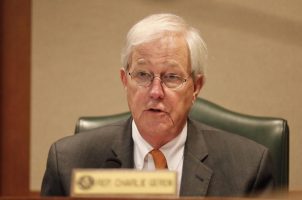Sheldon Adelson Hires Group of Lobbyists in Texas, Could be Pushing Legalized Gaming in State
Posted on: December 1, 2020, 09:07h.
Last updated on: December 1, 2020, 10:14h.
Sheldon Adelson’s Las Vegas Sands Corp. has brought on board 10 lobbyists in Texas, according to state records. That prompts questions about what the casino mogul is planning just weeks before the state legislative session kicks off in January.

Rumors are surfacing Adelson may want to pave the way for legal commercial gaming. Other possibilities include he is trying to block any online gaming initiative or stand in the way of some other bill.
Adelson is a Republican national mega-donor and has influence. He and his wife, Miriam, recently donated $75 million to a political action committee that supported President Donald Trump’s reelection. In Texas, the couple donated $4.5 million to House Republican candidates during the recent campaign.
“It could well be that Adelson’s donations were a twofer, helping to ensure continued GOP control over congressional redistricting in Texas and strength in the US House while also earning the gratitude of Texas Republican legislators for helping them retain control of the Texas House, with an eye toward the adoption of casino gambling in 2021,” Mark P. Jones, a fellow in political science at Rice University’s Baker Institute, told Casino.org.
Clyde W. Barrow, chair of the Department of Political Science at the University of Texas, Rio Grande Valley, further explained to Casino.org, “One of the key political factors that has been missing in Texas is a well-financed and reputable casino company coming into the state to bankroll a lobbying and public relations campaign for expanding gambling.” Adelson could fill that role.
The entrance of someone with gravitas and deep pockets such as Sheldon Adelson could be just what the pro-gambling movement needs to unify its efforts behind a common goal,” Jones said.
“At the same time, Adelson’s status as a major and loyal GOP donor could help convince many Republican lawmakers — the principal roadblock for casino gambling — to support letting Texans decide if they want casino gambling or not in a November 2021 constitutional amendment vote.”
When contacted by Casino.org, a Las Vegas Sands spokesperson did not provide a comment. Last month, Sands reportedly was asking $6 billion for its Las Vegas properties.
Texas Legislature Looks for Revenue
This year, Texas also is facing a revenue shortfall. It is tied to the COVID-19 pandemic, as well as a decline in oil and natural gas revenue.
“The two principal alternatives being discussed … are the legalization of marijuana and the legalization of casino gambling,” Jones said. “The legalization of marijuana holds little prospect of passage by the conservative Texas Senate, let alone surviving Gov. Abbott’s veto pen.”
That leaves casino gambling as the best alternative for avoiding as many cuts to vital social services as possible without incurring the wrath of Texas voters by raising their taxes,” Jones added.
Texas state Rep. Joe Deshotel (D-Port Arthur) continues to advocate for a constitutional amendment that would permit casinos in select coastal areas of the state. He believes reception to such a bill now would be more sympathetic, reported KXAN, a local TV station.
A majority of Texans support the legalization of commercial casinos in the state, opinion polls have revealed. To pass, an amendment would need to be approved by the legislature and then get the backing of the public in a statewide vote.
It would address the fact that many Texans visit out-of-state casinos. They spend at least $5 billion annually at casinos in nearby states, including Nevada, Barrow said.
Casino Bills Remain Longshot
But skepticism remains on just how far the proposal will go. “Nothing is off the table but expansion of gaming would be likely low on the list as a way to expand the state’s revenue,” Barrow cautioned.
In the past casino bills did not move forward. “Texas is a honeypot for gaming interests, and every session legislation is introduced to expand it in Texas. Lobbying the legislature is a long-term affair since things move slow in Austin,” Brandon Rottinghaus, a political science professor at the University of Houston, told Casino.org.
Casinos previously were not needed to boost employment or as a revenue generator. And most importantly Texas Republican leaders did not want to anger evangelical voters, who are seen as opposing casinos.
In my conversations with [gaming] industry executives over the years, they have all been reluctant to go into Texas, because the political climate has made it such a long shot that it is considered a bad investment of political resources,” Barrow said. Gov. Greg Abbott, Lt. Gov. Daniel Patrick, and Attorney General Ken Paxton are “fierce opponents” of casino gambling, Barrow adds.
Barrow further predicts if the issue gets discussed, “It will become very complicated very quickly.” Other interests become involved in the debate, such as the racetracks, the state’s three federally recognized Indian tribes, and regional interests, “who will all want a piece of the casino pie,” Barrow said.
In the past, pro-gambling forces lacked unity, Jones added. He explained that the racetracks wanted to add slot machines at existing tracks. Tilman Fertitta and other hotel owners backed creating a small number of destination casinos in the metro areas or along the coast, Jones said.
Related News Articles
Most Popular
Las Vegas Overstated F1 Race’s Vegas Impact — Report
Mega Millions Reportedly Mulling Substantial Ticket Price Increase
NoMad Hotel to Check Out of Park MGM on Las Vegas Strip
Most Commented
-
End of the Line for Las Vegas Monorail
— April 5, 2024 — 90 Comments -
Mega Millions Reportedly Mulling Substantial Ticket Price Increase
— April 16, 2024 — 8 Comments -
Long Island Casino Opponents Love New York Licensing Delays
— March 27, 2024 — 5 Comments
















Last Comments ( 2 )
I wonder if the politicians in Texas are getting political contributions from out of state casinos, and lobbyists, to keep casinos out of Texas? I'm not saying they do, but you have to admit it would be in the other states best interests if Texas doesn't approve gambling.
Texas needs to wake up. Biden & company is about to gut the oil & gas industry. Texans will go out of state to gamble. The state not having gaming will not stop Texans from going elsewhere to gamble. Start looking at this revenue stream seriously.